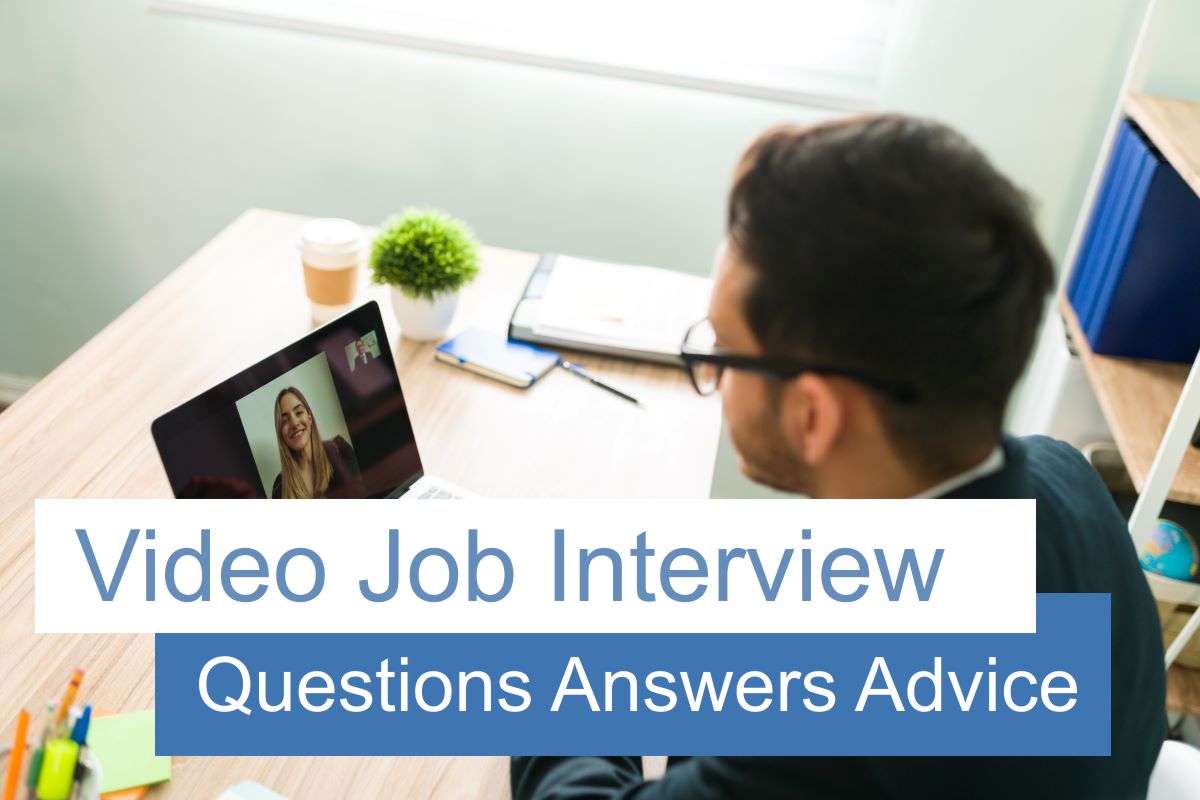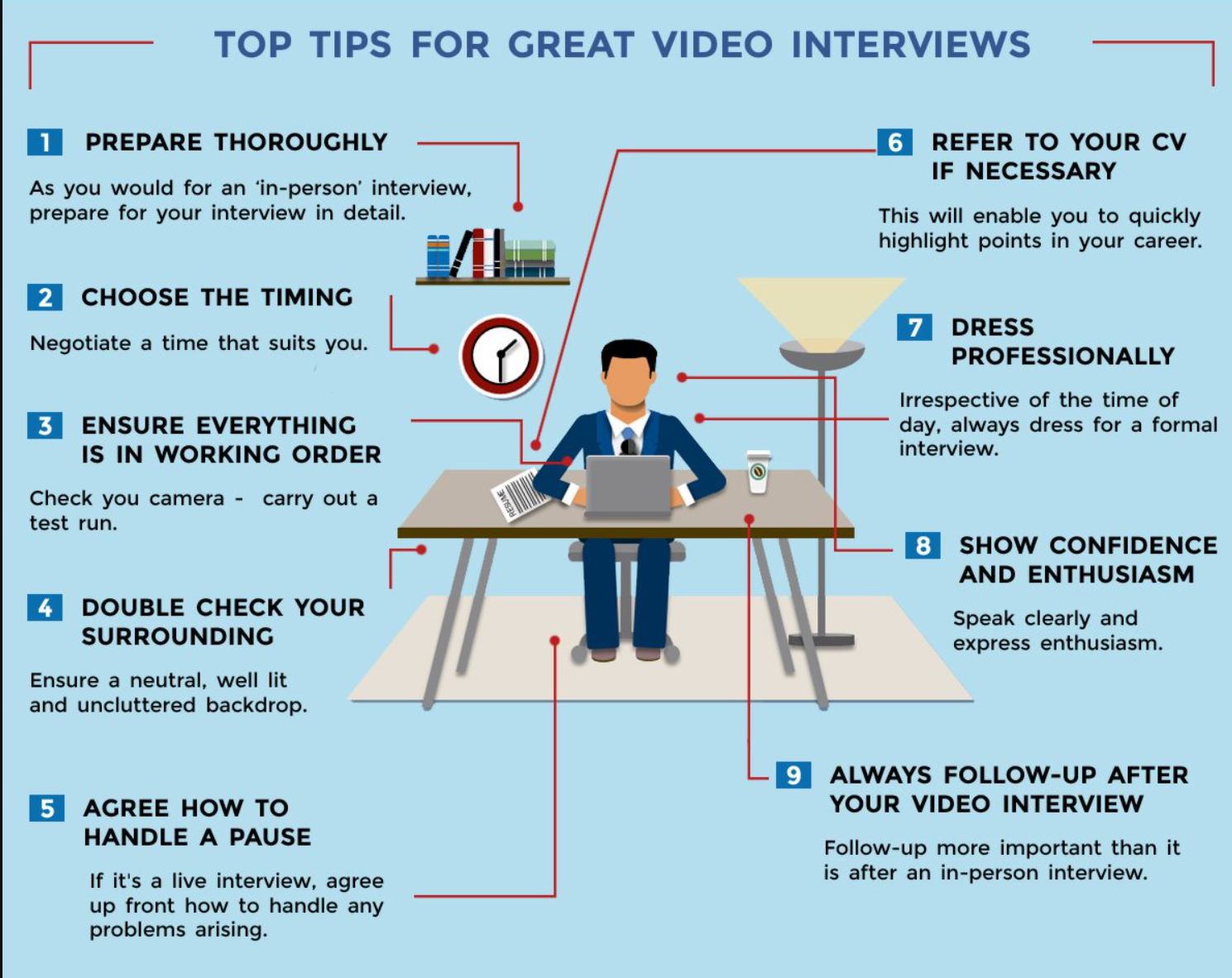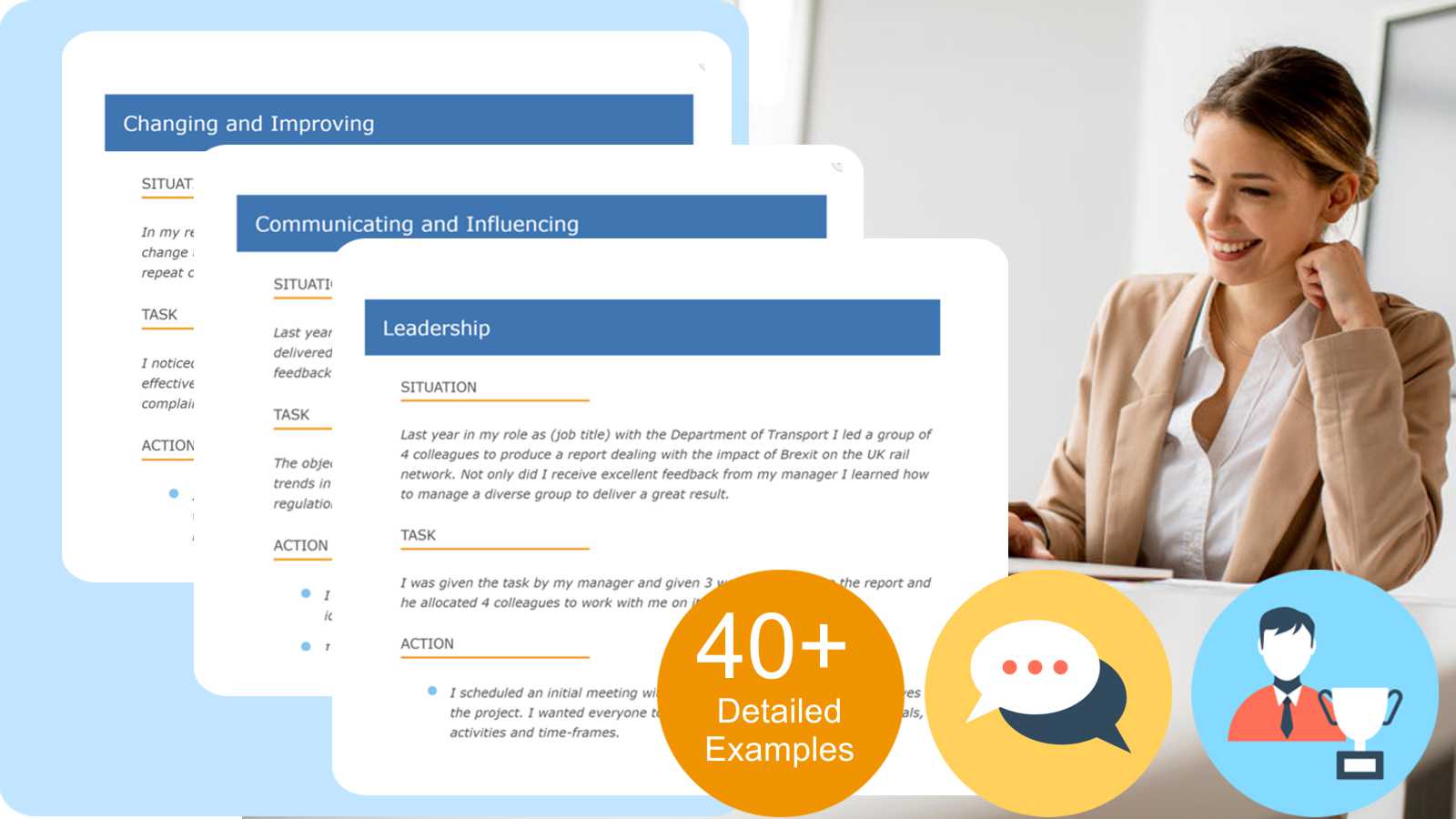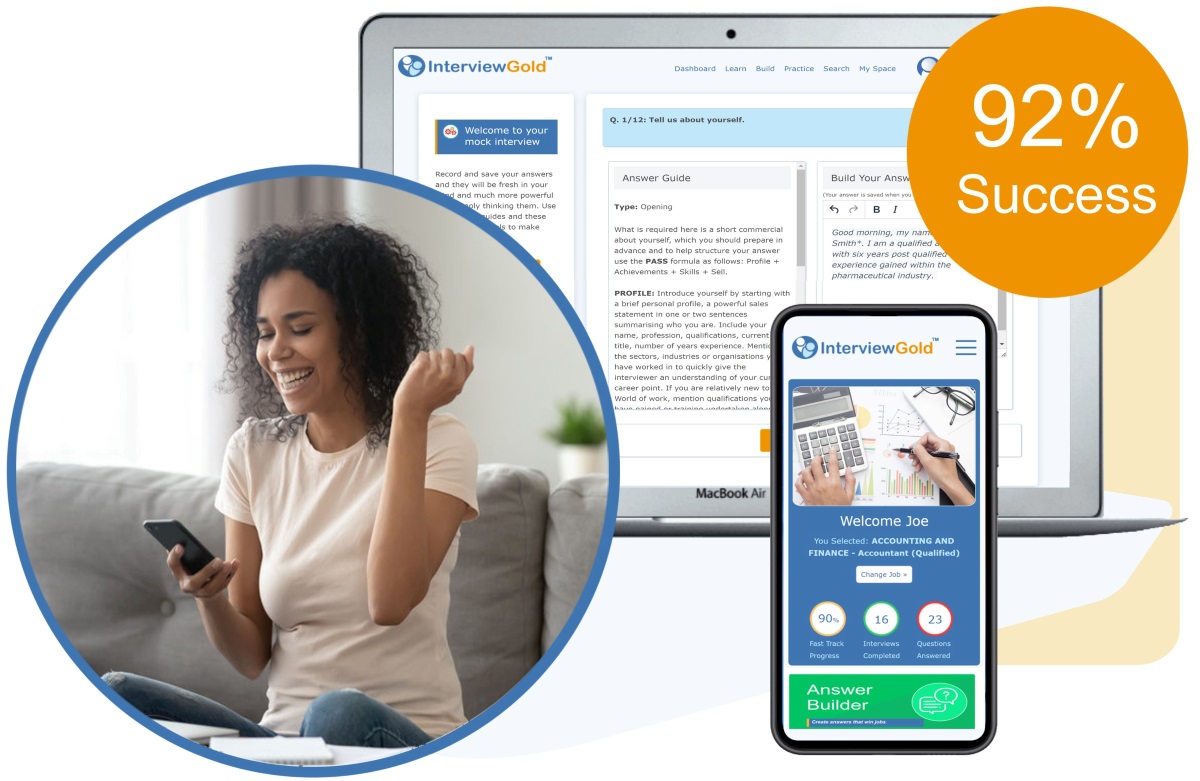
Have you been invited to take part in a Civil Service pre-recorded interview? Perhaps you have been told you will be taking part in a live face-to-face video interview?
Many Civil Service and UK Government departments such as the DWP, Home Office and HMRC are now using video and pre-recorded interviews as standard.
These can be daunting especially if you are new to the recruitment market or perhaps coming back after a break.
Video interviews are here to stay and in this guide, we provide top tips that will help you sail through and get the job at whatever level you are applying.
Learn how to give brilliant answers in any job interview with InterviewGold.
In This Guide:
- What is a Pre-recorded Interview?
- What is a Live Video Interview?
- How does a Civil Service Pre-recorded or Video interview work?
- Civil Service Pre-recorded Interview – What to Expect
- Civil Service Live Video Interviews – What to Expect
- Civil Service Video or Pre-recorded Interview Questions Types
- Civil Service Pre-recorded Interview Questions Examples
- DWP Pre-recorded Interview Questions
- 14 Top Tips for Success in Your Pre-recorded or Live Video Interview
- Frequently Asked Questions About Civil Service Pre-recorded and Video Interviews
- How to Succeed in Any Civil Service Interview
What is a Pre-recorded Interview?
In simple terms, a pre-recorded interview is a video of a person asking you a series of pre-determined interview questions. You will record your answers using your webcam or camera on your device. The system will allow a short time to think of your answer and then you will have a set time to record your answer usually up to 2 minutes. You will not be able to repeat or go back to re-record an answer.
These pre-recorded interviews are used as a screening tool. Once you have completed your recording, the employers will review your responses and decide whether to take you to the next stage which may be a live video interview.
What is a Live Video Interview?
A live or virtual online video interview is one that is conducted using your webcam or camera usually via a software tool such as Zoom, Google Teams or Skype. This type of interview is live where you have one or more interviewers asking questions with you giving your responses just as you would in an in person interview.
Video interviews have become increasingly common due to their convenience, especially for remote or global hiring processes. These live video interviews provide a flexible and accessible way for the employer to connect with you without the need for you to travel.
How does a Civil Service Pre-recorded or Video interview work?
Video job interviews, whether pre-recorded or live have evolved to accommodate different needs and preferences, providing flexibility for both the Civil Service and you as a candidate.
Let’s look at how each of these work within the Civil Service. Bear in mind, these may vary a little between department.
Civil Service Pre-recorded Interview – What to Expect
- Your interview invite will advise that you will be taking part in a pre-recorded interview. This will usually provide the timings, when you have to complete it by and how to access.
- Once you click start, you will be taken through an introduction, explaining ow it works and the behaviours they will examine you on.
- You will be taken through a process to make sure your set up is working, the camera and microphone are working. Take time to check everything including your appearance and the background.
- When you are ready, click “next” and the interview will start officially. You may be given a warm-up question to get you familiar with the process and this will not be scored. A countdown will show, and you will usually have between 6 – 8 questions. You will have time to think about your answer the about 2 sometimes 3 minutes to answer.
- You will not be able to go back and re-record a previous question however you can take a break between each question.
Civil Service Live Video Interviews – What to Expect
- You will be advised in advance that your interview will be online via a video conferencing platform. The most common are Skype, Microsoft Teams or Zoom.
- You will also know in advance the date and time and how long the interview will last.
- Just like a face-to-face interview, your interviewer or panel will interact directly with you, they will ask questions and you will give an immediate response.
Get Perfect STAR Answers: Know What To Say in Your Civil Service Interview
Civil Service Video or Pre-recorded Interview Questions Types
Predicting the questions they will ask in your civil service pre-recorded or live video interviews is challenging. They will vary from department to department and from role to role.
However here is what we suggest you prepare for based on experience to date.
Competency Interview Questions Exploring the Relevant Behaviours
You will be told in advance which of the behaviours they will require in the job and which they will examine you on. Usually anywhere from 4-6 and including for example, communicating and influencing, delivering at pace etc.
Strength Based Interview Questions
Some pre-recorded interviews in the Civil Service are majority strengths based. Certainly, at entry level posts such as DWP work coach for example, we see 6 out the 8 questions being strength based.
Learn all about strength based interview questions here.
Technical Interview Questions
For some roles such as finance or accounting software and IT, legal, you should expect some technical questions. It may be that these are covered in a test, however certainly in a live video interview, we have seen technical questions asked.
Blended Interview Questions
We would expect this type of questioning to form the vast majority of civil service pre-recorded and via live video. Your interview will be a mix of traditional, strengths, competency and technical. Of course, these will vary across roles and levels too.
Civil Service Pre-recorded Interview Questions Examples
Here is a sample civil service pre-recorded interview containing 8 questions. How would you answer?
- Tell us about the most exciting thing you have done recently.
- What activities do you enjoy in your spare time?
- Why do you want to work for this department [eg. Home Office, DWP, MOD]?
- Give a recent example which shows how you can complete tasks within tight deadlines?
- Tell us about a time when you had to overcome an obstacle in order to get your project completed.
- This role involves dealing with clients. Describe a time when you successfully resolved a challenging situation with a customer.
- Do you prefer starting tasks or finishing them? Tell us why.
- Tell us about a time when you handled change effectively.
DWP Pre-recorded Interview Questions
The DWP use pre-recorded interviews as standard especially for posts such a job coach. The questions above are all relevant and have been seed to be used however also expect more complex behavioural questions exploring communicating and influencing, managing and quality service, delivering at pace etc.
Here are some variations of DWP pre-recorded interview questions used which are good to practice with.
- Tell us the approach you would take with a challenging customer and how would you influence them to accept your outcome? (Communicating and Influencing)
- Can you give me an example of a time when you have had to make a difficult decision in the workplace? (Making Effective Decisions)
- Describe a time when you went beyond expectations to provide a great service? (Managing a Quality Service)
- Tell me about a time when you had to communicate complex information to a customer?(Communicating and Influencing)
- Tell me about a time when you have had to analyse complex data in order to make a correct decision? (Making Effective Decisions)
- Give me an example of a time where you have had to prioritise one task over another. What criteria did you use? (Managing a Quality Service)
Get Expert Answers for Your Target Civil Service Job
Get Instant Access to InterviewGold and Get The Job You Want
14 Top Tips for Success in Your Pre-recorded or Live Video Interview

Here are our top tips for success in your Civil Service pre-recorded and live online video interview.
As with any interview, the key to success, is thorough preparation.
- Know the Interview Format: By this we mean, be clear about the type of interview they are asking you to take part in. You will most likely know in advance whether it is a live or pre-recorded interview.
- Check also how long it will last: Find out if they give you the questions in advance. And especially for pre-recorded video interviews, be clear how long will have to give each answer.
- Review the job requirements: As you would for an ‘in-person’ interview, prepare for your interview in detail. Review the job description, research the role and department and review your CV and application.
- Choose your Timing: Check the time difference if relevant for your video interview and try to arrange a time that suits you where possible. For example, if you are not a morning person request an interview early evening.
- Choose the Right Environment: Select a quiet and well-lit space for your interview. Eliminate the risk of interruptions or distractions from other people or pets.
- Ensure a Neutral Backdrop: This may mean removing books and files for the duration of the interview. Your intention is to keep the interviewer firmly focused on you, not on your collection of books.
- Dress Professionally: Even though you’re not physically present, dressing professionally boosts your confidence and leaves a positive impression. Avoid patterns that may distort on camera and choose colours that complement your skin tone.
- Practice with Mock Interviews: Conduct mock interviews with friends or family to get comfortable with the virtual format. Practice answering common questions while maintaining eye contact with the camera, simulating the real interview experience. Use the InterviewGold webcam recording feature just like your real interview.
- Test Your Camera and Mic: At the start of a pre-recorded interview, you will have an opportunity to check and make sure everything is working. During this test, you can stop and start as many times as you like. If you are not happy, then take your time and come back another time or day.
- Take a Breather Between Questions: Be aware that once you start the official interview and start answering questions, you can’t rerecord or go back, You can however take a pause between the questions, Take some deep breaths, compose yourself and continue.
- Speak clearly and confidently: Be aware that you may be talking to more than one interviewer, even if you cannot see them. Speak clearly and express enthusiasm. A mumbled answer during a video interview does not project confidence.
- Pace Your Speech: It can be tempting to peak quite quickly during a video interview. Slow down, enunciate clearly and at a moderate pace. Avoid talking too fast or too slow, and be mindful of your tone. Remember to listen actively, allowing the interviewer to complete their questions before responding.
- Masterful Eye Contact: Maintaining eye contact is crucial in a video interview. Direct your gaze toward the camera, not the screen, to create a more natural and engaging connection with the interviewer.
- Proper body language: The normal body language indications such as a firm handshake are lost in a video interview. Candidates can, however, maintain an upright posture, smile and engage eye contact to compensate for what is missing. For jobs where interaction with colleagues takes place regularly online, the video interview is an opportunity to display how comfortable you are in handling technology.
Frequently Asked Questions About Civil Service Pre-recorded and Video Interviews
Where should I look during my video interview?
Most candidates will be tempted to look at the interviewer on the screen. That is ok if you are comfortable with that. However, we suggest it is best to look at the camera. On your phone this will be top right and on your laptop this is usually top centre.
During a pre-recorded video interview, can I read from notes or from my CV?
So, the simple answer is no, do not read from notes or CV. It is best to avoid the appearance of reading directly from a visible piece of paper on the desk. It may look as though you are making up your answer rather than remembering it.
Instead, we suggest taping notes on the wall behind the camera. In this way, while you might be glancing at them for inspiration, it will come across naturally to the interviewer.
How do I introduce myself during an online video job interview?
You will find that the interviewing panel, will control the pace and the questions. They should ask a standard opening such as tell us about yourself or talk us through your CV. This question gives you a chance to introduce yourself effectively. Also, it will set the tone for the conversation and create a positive first impression.
How to Succeed in Your Next Civil Service Interview
Preparing for your Civil Service pre-recorded and video interview can be a breeze with InterviewGold.
Not only do you get expert STAR answers covering the core behaviours and competencies, you will also create brilliant answers using the easy online Competency Answer Builder.
Plus practice your delivery until perfect with the interactive webcam recording tool.


